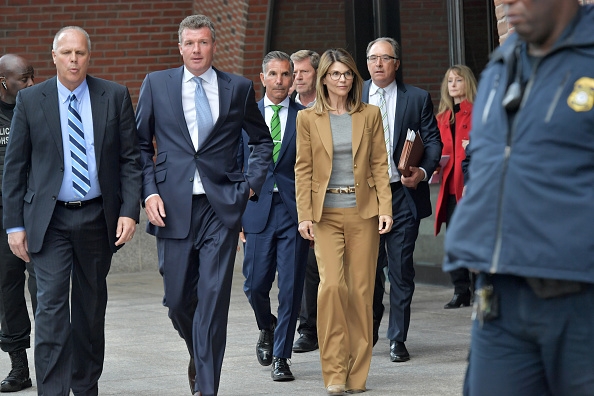You have /5 articles left.
Sign up for a free account or log in.

Paul Marotta / Getty Images
The University of Virginia announced this month that it had conducted a review of its admissions policies in the wake of the admissions scandal.
The university wasn't involved in the scandal. But officials said they wanted to investigate. What they found was mixed. The university found no evidence that any athletes had been admitted to Virginia through cheating on the SAT or pretending to be an athlete, as was the case for many of those indicted. But back a few years, the university found "a small number of cases" where "the prospect of a gift appears to have motivated the recruitment of student-athletes."
 In response, the university said it would impose a number of rules, including a ban on soliciting or accepting gifts from athletes or their family members during the recruiting and application process.
In response, the university said it would impose a number of rules, including a ban on soliciting or accepting gifts from athletes or their family members during the recruiting and application process.
To some, this would be clear evidence of universities (even one not in the original scandal) taking action.
But has the world of admissions really taken hold of the scandal? And let's be honest, it's not just Operation Varsity Blues. Harvard University escaped that one but was caught up in a scandal over the sale of the fencing coach's home. (It fired the coach.) More recently, suburban Chicago parents have been giving up guardianship of their children so they can qualify for more aid.
Add up all the beneficiaries of the scandals, and they are a minute share of the population. But there are legal ways (used by far more applicants) that advantage the wealthy in the admissions process. No college has looked at the status quo and eliminated, say, early decision.
The student body presidents from Stanford University; the University of California, Los Angeles; the University of Southern California; and Yale University this month wrote an op-ed for the Los Angeles Times in which they said "Across the United States, many high school students from high-income families have the resources to attend elite private schools, take personalized SAT/ACT prep courses, go on resume-boosting travel programs, embark on cross-country college tours to 'demonstrate interest,' and employ professional college counselors to strengthen their application materials. Students from lower-income backgrounds often have no opportunity to engage in any of these activities."
In their piece, they took on everything from public school financing to the reliance of leading colleges on standardized tests.
"Exposing the people involved in the admissions scandal has given the public a sense of how readily the system can be manipulated by wealth," they wrote. "But the reality is that justice won't be served simply by holding some headline-making families accountable. That will only happen once the larger, deeply rooted institutional barriers to higher education are acknowledged and removed so that students, regardless of the status and wealth of their parents, have truly equitable opportunities for admission into the university of their choice."
Annie Reznik, executive director of the Coalition for College, said via email: "Reform within higher education admissions is and always should be under way to create equitable admissions processes and student bodies that reflect the populations we serve. Operation Varsity Blues brought to light families and some university personnel who manipulated the admissions process for their own personal gain. It is important to note that the vast majority of those who work in admissions spend countless hours pairing students with their institutions and have nothing more than the students' potential in mind."
She added that in her role with the Coalition for College, "I see the work being done by admissions officers and their teams to diversify who attends their institutions and to extend information about higher education to students who might not have otherwise thought they were a fit for all that academia offers. While much attention has focused on the nefarious efforts of a few, there has been little attention given to the hard work performed by many to expand opportunities. Our processes will never be perfect, but collectively we are working to make them as fair and equitable as possible."
Jenny Rickard, president and CEO of the Common Application, said that after the scandal broke, the Common App and Arizona State University hosted a group of 40 enrollment leaders to talk about "the systemic issues impacting students and families as they navigate this process."
"Specifically, the leaders cited the importance of redefining the predictors of success in college that currently tend to privilege the privileged," she said. "We also need to actively alleviate an applicant's anxiety and reduce the barriers that students face in applying to college by being more transparent about institutional admission and financial aid policies and practices. And, we must continue to create new pathways to postsecondary education for all learners, not just those going directly from high school."
Lloyd Thacker, executive director of the Education Conservancy, said he thought the op-ed was on target. It "conveys vision despite the lack of example displayed by their colleges' presidents."
Akil Bello, an educational access consultant who works with low-income students and is co-founder of Bell Curves, a test-prep service that seeks to serve a broad cross-section of students, said, "As far as I know there have been no substantive systemic changes implemented (or even discussed) that would prevent the type of abuses that led to Operation Varsity Blues, the accommodations scandal or the guardianship scandal."
The public thinks "that colleges, like teams in the National Basketball Association, are part of a unified league playing according to one guiding set of organizational laws, in fact, there are few, if any, universal rules governing admissions policies and procedures," he said.
"The scope and variety of the American education system which makes it great also makes it ripe for abuse. Colleges and testing companies are in a perpetual game of whack-a-mole with applicants who are willing and able to lie, cheat, and steal to get into the 'right' college," Bello said. "Every loophole that is discovered will simply lead abusers on a quest for a different pathway to secure an unfair edge. Additionally, we are unlikely to hear about most of the institutional reforms that will be implemented, since they are likely to take place out of the public eye. It's rare that changes to policies as significant and public as what occurred at University of Illinois and at ACT happen, more likely than not there will be additional verification and screening that occurs internally at these institutions in response to these scandals."
Real reform, he added, "will only take place if those in power from college presidents to high school counselors acknowledge and actively work to dismantle the systemic additive advantages that are given to families with wealthy and influence."








